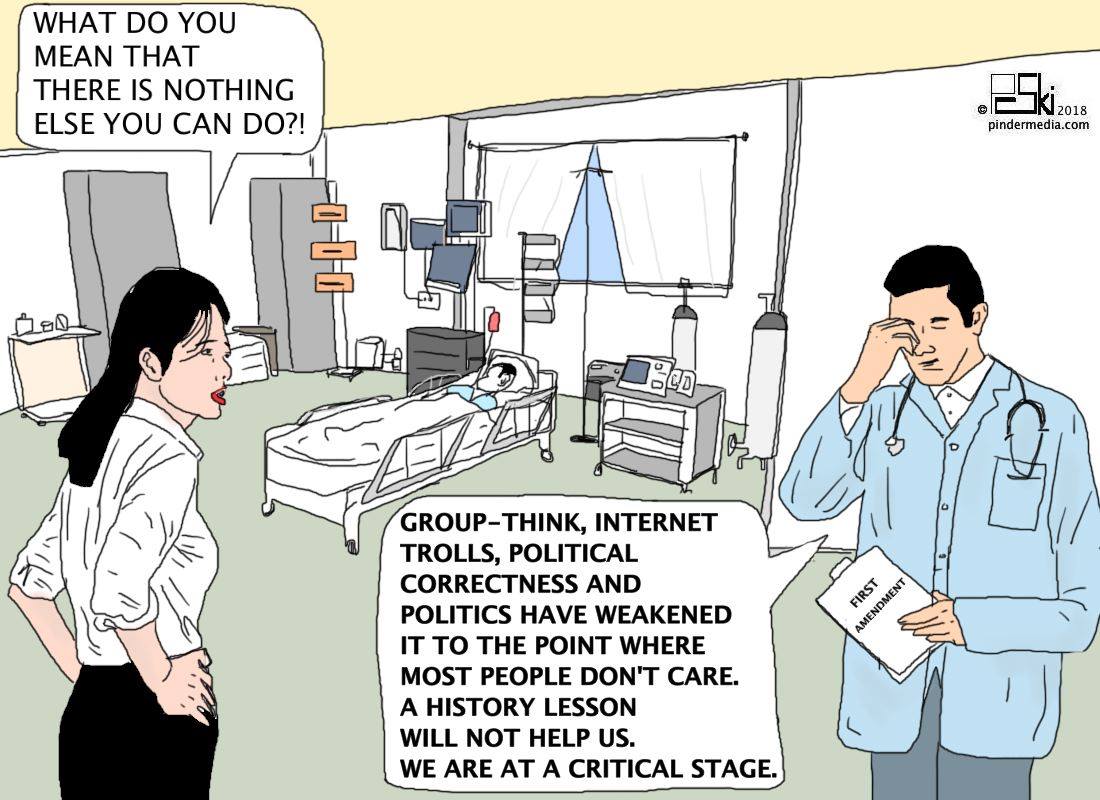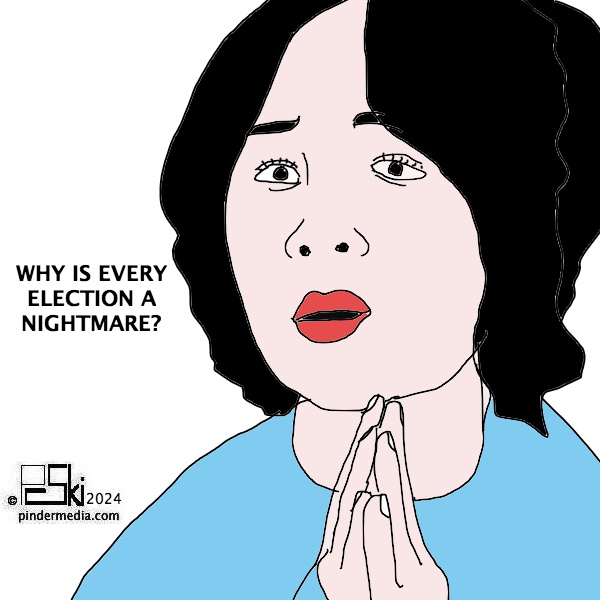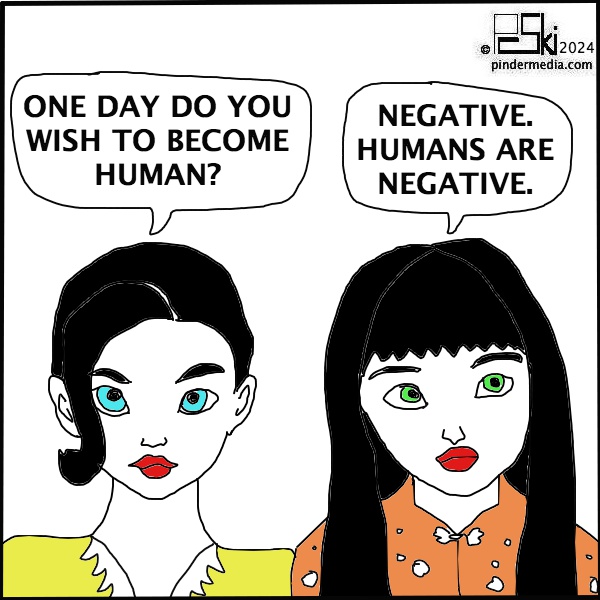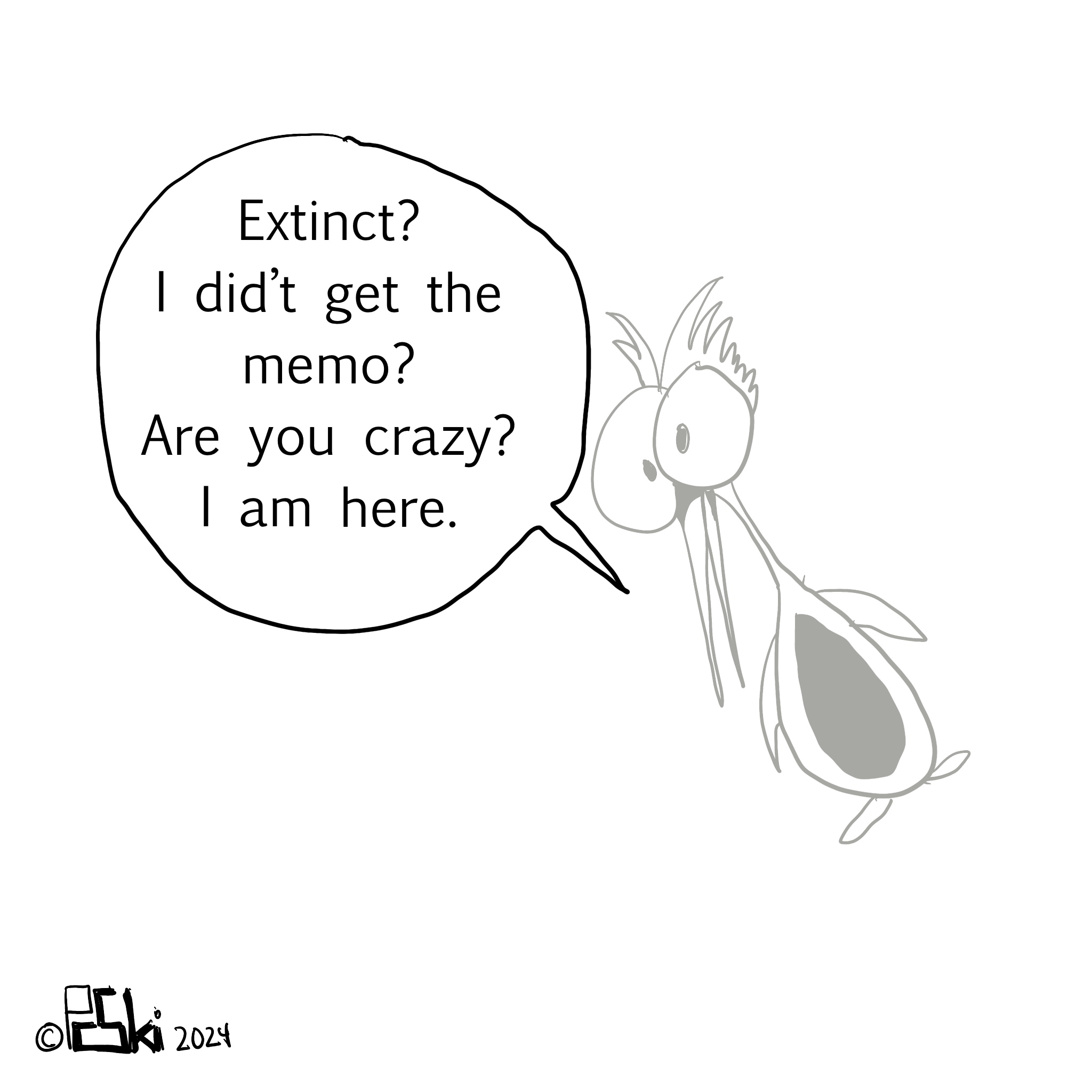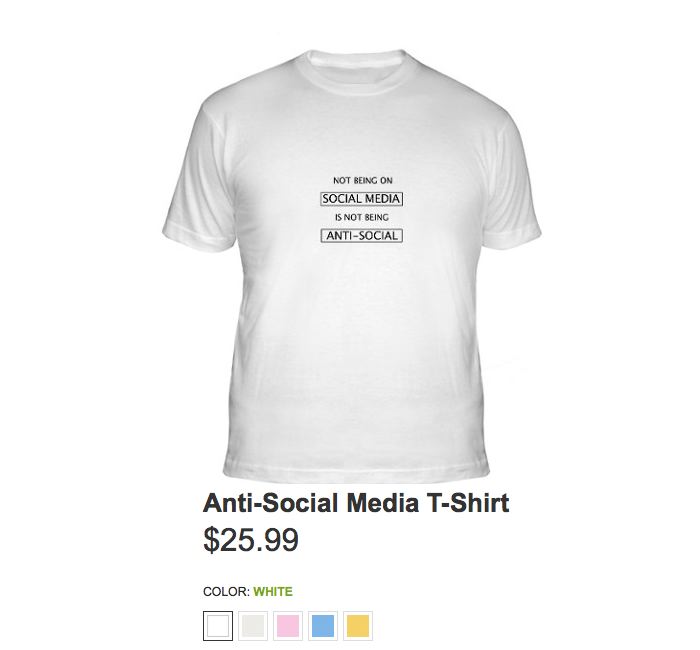|
cyberbarf VOLUME 23 No 4 EXAMINE THE NET WAY OF LIFE NOVEMBER, 2024
©2014 Ski Illustration cyberbarf NOVEMBER, 2024 ON LIFE SUPPORT ARTISTEIN QUICK BYTES iTOONS FOUND BUT NOT LOST ON THE INTERNET WHETHER REPORT
©2024 Ski Words, Cartoons & Illustrations All Rights Reserved Worldwide Distributed by pindermedia.com, inc
cyberculture, commentary, cartoons, essays
|
|
cyberbarf ON LIFE SUPPORT COMMENTARY
In 2022, UNESCO warned that “the business model of the news media is broken.” The heart of the news business, advertising revenue, has dried up in recent years, with Internet giants such as Google and Facebook taking more than half of that spending, the report said. Only 25 percent goes to traditional media organizations, according to a study by the World Advertising Research Center, reported Yahoo News. Traditional broadcast channels have cut back on time and resources allocated to news gathering. Networks show less than 2 hours of hard news per day, as talk and celebrity chat shows are more popular with daytime home viewers. Cable news channels have mostly abandoned original reporting (except for disaster coverage) for opinion based political shows. Local newspapers have been taken over by chains, who then are taken over by investment bankers, who strip them to bare bones. Zombie newspapers litter most of America. A few independents, employee owned or non-profit corporations muster on in a losing battle to retain readers. Young people rely more on social media, TikTok and YouTube celebrity content creators for “news” which may not be truthful reporting at all. Copy editing, fact checking and actual verification from reliable sources are becoming extinct. The media landscape is miles of broken ceramic pottery, shattered by misinformation, lack of local news, and distractions. Many have zoned out from the drone of political thought in all aspects of their lives: from work, education, groceries, energy choices and entertainment choices. As news organizations get weaker, government intrusion into controlling free speech grows stronger. As part of a national crackdown on disinformation, Brazil's Supreme Court suspended access to X, formerly known as Twitter. The court accused the social media platform of refusing to remove accounts charged with spreading fake news, and touting other judicial rulings. Free speech advocates shutter at the thought of the courts gatekeeping what information is true. Legislators want to control social media platforms but for what purpose? They often cite bad material for children, disinformation about candidates and illegal foreign election influencing. What national candidate has not misled, lied or fabricated accusations against an opponent in order to sway voters? In fact, this year's US presidential election has boldly embraced admitted LIES as a viable campaign strategy. Libertarians are alarmed that the free market of ideas will be silenced by government regulation and news media owners not caring about their public trust to be the fourth branch of democracy to check political corruption. Artificial Intelligence is now has pushed news media after US streaming platform Peacock introduced AI-generated custom match reports during the Paris Olympics this year, read with the voice of sports commentator Al Michaels, fueling fears AI could replace journalists. But AI does not pick up a phone to interview experts, eyewitnesses or officials. AI does not go to attend school board meetings to ask questions. AI has never graduated from journalism school. Truth has taken a back seat to personal feelings and opinion. The internet has opened avenues of like-minded people to bias confirm their thoughts and actions. It is a dangerous potion for deceit, disharmony, distraction and dilution of fundamental morals and values, respect of property and the law, and democratic institutions. Journalism and free speech appear to be on life support. No one is even bothering to treat the symptoms (advertising and subscription losses, bad ownership, deep cut backs) from the cause (reader disengagement, stronger but less reliable sources of information, attitude changes on importance of facts, and apathy.)
cyberbarf ARTISTEIN MODERN MONSTER Rupert Murdoch's Dow Jones and the New York Post in a recent lawsuit have accused artificial intelligence startup Perplexity of a “brazen scheme” to steal their journalism for its AI-driven search engine. The publishers, both subsidiaries of News Corp, alleged the AI startup, which is seeking to raise up to $1 billion in a funding round that will value it at $8 billion, was “engaging in a massive amount of illegal copying” of their work. The lawsuit said Perplexity is diverting customers and critical revenues away from the news publishers. Perplexity's search engine allows users to get instant answers to questions, with sources and citations, using large language models (LLMs) from platforms such as OpenAI and Anthropic. However, its answer engine copies on a “massive scale of copyrighted news content, analysis, and opinion as inputs into its internal database,” the lawsuit said. The generate responses to user's queries is claimed to be wholesale, intentional copyright infringement. AI generative search engines continue to be charged with theft of ideas, art and copyrighted works. But the law has been slow to stop AI companies from continuing to use and misuse publisher's materials for AI's own profit. As infringement cases slowly make their way to trial, some AI companies have gone out to license publisher content to continue to “train” their AI models (which basically contradicts its defense that it is not scraping information for regurgitation to users). The boom in everything AI has created a monster than needs to feed on more and more data in order to survive (i.e. improve from being a parrot to a rudimentary trained lap dog.) The BBC recently did a series of stories debating the AI influence on the modern world. It wrote that when Marcel Duchamp proposed that a porcelain urinal be considered art and submitted it for exhibition in early 20th Century New York, he put the art world on its head. He argued that anything could be considered as art, if chosen by the artist and labeled as such. It was a profoundly revolutionary thought which challenged previous notions of art as beautiful, technically skillful and emotive. Proponents of AI reason in the same way: AI-created artworks are disrupting the accepted norms of the art world. (However, the urinal was molded by a human being and repurposed by an artist. AI artworks have been critically denounced as derivative works of known artists.) Other proponents state that photography challenged the imagery of realistic painters. But photography, they claim, did not render fine art painting obsolete or endangered. But again, a photographer is trained to compose a picture before the shutter snaps, experience with lighting, settings, angles and human creativity is at the core of an excellent photograph. All those principles reside in the human artist so that comparison is more apples to oranges (or in AI terms an apple painted orange.) Academics think that AI is merely a tool like a camera. AI technology is the new invention that should be let to run free. AI artworks have created a new kind of art lover, they claim. But it is one thing for a painter to copy a master work on a canvas with their own paint brush strokes compared to a machine program literally taking existing works and manipulate them in layers to create variations. Supporters say that the non-physical creation of new AI art does not make it a lesser art form. Are AI supporters giving the public excuses? Or are they implying that AI generators are just as “human” as human artists creating their own works? But there has been no clear proof that machines have independent creativity and reasoning. OpenAI and Google have been touting advanced “reasoning” capabilities as the next big step in their latest artificial intelligence models. ArsTechnica reported that a new study from six Apple engineers showed that the mathematical “reasoning” displayed by advanced large language models can be extremely brittle and unreliable in the face of seemingly trivial changes to common benchmark problems. The fragility highlighted in these new results helps support previous research suggesting that LLMs use of probabilistic pattern matching is missing the formal understanding of underlying concepts needed for truly reliable mathematical reasoning capabilities. The conclusion was clear: current LLMs are not capable of genuine logical reasoning. Are the AI companies lying or exaggerating their claims? Perhaps, as Wall Street is rewarding the hype over the accomplishments (forming what one could call an “AI market bubble.”) If AI models cannot reason, a fundamental concept of intelligence, why are so many people putting their lives and reputations on the line for AI generated reports and outputs? The Korea Herald reported that South Korea is set to introduce artificial intelligence-powered textbooks into its schools starting in March, 2025. This initiative will begin with third and fourth graders in elementary schools and first-year students in middle and high schools. News of AI textbooks has sparked mixed reactions. Some view it as a true “education transformation,” or even a “revolution,” while others simply call it just a new tool. Neil Selwyn, a professor at Monash University in Melbourne and a researcher on the intersection of digital technology and education, warns the excitement around AI textbooks might be a part of a larger “hype bubble” that could eventually burst. It could leave behind unsolved challenges, he said. South Korea's project is ambitious. It involves $276 million in the budget for school digitization to create a more personalized learning experience, collect data to improve educational outcomes and establish South Korea as a global leader in AI education. South Korea culture has been quick to adopt new technologies. It is one of the most wired countries in the world. People live, breathe, bank and work through their smartphones. But just as teachers frown upon wholesale copying from wikipedia as a trusted source for student papers, AI has less oversight than the internet's biggest encyclopedia. School boards would fire crazy teachers, but what will they do when AI textbook teachers hallucinate answers to test questions? What is going to be graded first: AI or students' relying on AI? Does the AI monster win out after spending hundreds of millions of dollars in development to a public that wants lazy answers to their questions? Officials are putting too much trust into AI technology. But trust has to be earned. So far, AI has not demonstrated the same knowledge base of a tenured professor. Dr. Frankenstein challenged the idea of human mortality. He created a re-animated monster of human body parts. But that monster had only rudimentary brain or instinctive emotions. AI is today's Frankenstein's monster: an idea that cannot replace real human beings.
cyberbarf QUICK BYTES CYBERCULTURE NATIONAL CAPS DAY. Did you know there is a National Caps Lock Day? It was considered rude to send a text message or email in ALL CAPS. It was perceived that you were YELLING at the person. Back in the day, that is what the Internet worried about: civility. But now? Oh, boy, being called rude is probably now considered a compliment. DUH! The Simpsons season premiere confused most viewers. Former writer Conan O'Brien was the MC for the show's final episode. This finale was allegedly written by artificial intelligence. It was supposed to spoof the lack of humor of AI, but the set-up of the Simpsons ending overpowered the entire episode. It came off as a dud. FINDING AN AUDIENCE. According to streaming music platforms, rock music ranks very low . . . classic rock still is formatted on radio stations but current bands find it difficult to have hit songs or successful albums. But there is one area where rock music, especially metal genre, is welcomed with open arms . . . the niche market of video game soundtracks. It seems like an odd pairing, but realize that Guitar Hero put the console game system in the living room. So, rock on while gamers rock out. MILESTONE TV . Nielsen reported that for the first time, a streaming platform had more than 10 percent rating. YouTube TV hit that milestone at 10.4 percent of total TV market. Streaming platform market share stands at 41.4 percent; cable broadcasting at 26 percent; and traditional broadcasters at 20.6 percent. Netflix was the second biggest streamer at 8.4 percent share. But at the same time, another report indicated that consumers are complaining streaming services are costing more while the quality of the programming is going down.
iToons
cyberbarf FOUND BUT NOT LOST ON THE INTERNET
NASA's Webb telescope continues to dazzle with its photographs. This is the clearest picture of Venus. It looks groovy. Like London Mod from the 1970s. It looks like AI generated art. Source: NASA
Florida got double punched by hurricanes. The second took the roof off Tropicana Stadium in Tampa. Ironically, the stadium was being used as a staging area for first responders. Officials stated the roof may not be repaired before the 2025 baseball season. Source: NY Daily News
What is wrong with this picture? American Rounds is selling ammo by vending machine. Huh. Where and why? It is perplexing marketing campaign in an era of mass shooting, negative media attention and litigation society. Source: Reason.com
|
|
TRICK OR TREAT IS NOT AN OPTION. |
|
LADIES PJS ON SALE NOW! |
FREELANCE CARTOONS, ILLUSTRATIONS FOR NEWSPAPERS, MAGAZINE, ON-LINE DO YOU CONTENT? CHECK OUT
|
|
|
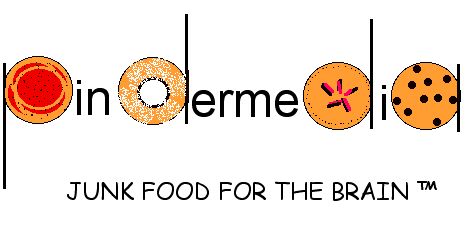 |
 |
|
cyberbarf THE WHETHER REPORT |
cyberbarf STATUS |
|
Question: Whether either US Presidential candidate can close the deal with voters before Election Day? |
* Educated Guess * Possible * Probable * Beyond a Reasonable Doubt * Doubtful * Vapor Dream |
|
Question: Whether WAYMO self driving taxi cabs will be common place by 2026? |
* Educated Guess * Possible * Probable * Beyond a Reasonable Doubt * Doubtful * Vapor Dream |
|
Question: Whether quality control for heavy manufacturers (vehicles, airplanes) becoming a serious issue for consumer buyers and regulators? |
* Educated Guess * Possible * Probable * Beyond a Reasonable Doubt * Doubtful * Vapor Dream |
|
HOLIDAY SHOPPING. CHECK IT OUT. HAVE FUN. SUPPORT THE SITE.
LADIES' JAMS MULTIPLE STYLES-COLORS $31.99 PRICES TO SUBJECT TO CHANGE PLEASE REVIEW E-STORE SITE FOR CURRENT SALES
|
PRICES SUBJECT TO CHANGE; PLEASE CHECK STORE THANK YOU FOR YOUR SUPPORT!
NEW REAL NEWS KOMIX! |
 |
cyberbarf
Distribution ©2001-2024 SKI/pindermedia.com, inc.
All Ski graphics, designs, cartoons and images copyrighted.
All Rights Reserved Worldwide.

